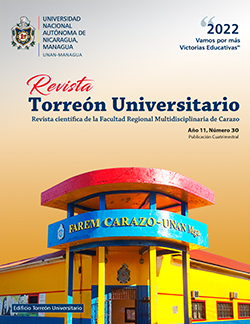Contextual transposition: Didactic strategy for the writing of the argumentative essay
DOI:
https://doi.org/10.5377/rtu.v11i30.13380Keywords:
Argumentation, sociocultural approach, central idea, written production, dialogic text, contextual transpositionAbstract
The objective of this educational research was to assess the impact of the didactic strategy "contextual transposition" in the writing of argumentative essays. This strategy is located in the sociocultural approach of textual production and emerges as an innovation in the diagnostic stage of this research. Four phases were defined for its application: a) sensitization, b) exploration and discussion, c) transposition and, d) evaluation. This is participatory action research, which was applied to tenth grade “A” students of the Benito Salinas de Dolores-Carazo Institute in Nicaragua, during the second semester of 2020. The research instruments were the diagnostic test, the didactic unit, the final test, the evaluation rubric of the essay written by the students, and the field journal. The main results are that from the contextual transposition, the students improved the written production, the definition of the thesis, and the organization of the ideas and structure of the essay, however, its impact on the reproduction of the sociocultural context or image of The reality of the student at the dialogic text level is limited, therefore, more studies must be carried out to understand and overcome the limitations.
Downloads
References
Aguilar, S. & Barroso, J. (2015). La triangulación de datos como estrategia en investigación educativa. Revista de medios y educación. N° 47, pp. 73-88. ISSN: 1133-8482.
Camargo M. Zahyra, Caro L. Miguel Á. & Uribe Á. Graciela. (2012). Estrategias para la comprensión y producción de textos argumentativos. Shopia, (8), pp. 120136.
Cárdenas Rojas, D. (2007). Breve guía de estilo para la redacción científica. Lima.
Castelló, M., Bañales, G. &Vega, N. (2010). Enfoques en la investigación de la regulación de la escritura académica: Estado de la cuestión. Electronic Journal of Research in Educational Psycology, 8 (3), pp. 1253-1282.
Colmenares, A. (2012). Investigación acción participativa: una metodología integradora del conocimiento y la acción. Voces y silencia: revista latinoamericana de educación. Vol. 3 (1), 102-115. ISSN: 2215-8421
Lezama, M. & Herrera, R. (2016). Estrategias de Enseñanza para el abordaje de la redacción de textos argumentativos en séptimo grado (tesis de grado para optar al título de licenciatura en Lengua y Literatura Hispánica, no publicada). Universidad Nacional Autónoma de Nicaragua, Managua (UNAN-Managua). Repositorio institucional.
Hernández Sampieri, R., Fernández Collado, C. & Pilar Baptista, M. (2014). Metodología de la investigación (sexta edición). USA: McGRAW-HILL. Ministerio de Salud. 2da edición.
Montoya Rios, A.M. & Motato Mejía, J.J. (2013). Secuencia didáctica para la producción de textos argumentativos (ensayo), en estudiantes de grado once de la institución educativa INEM Felipe Pérez de Pereira. (Tesis inédita de grado para optar al título de Licenciado en español y literatura). Universidad Tecnológica de Pereira. Colombia.
Torres, I. (2004). Una mirada pedagógica a la escritura de un ensayo argumentativo. Revista de Estudios Sociales, (19), pp. 97-105.
Downloads
Published
Issue
Section
License
Copyright (c) 2022 National Autonomous University of Nicaragua, Managua (UNAN-Managua).

This work is licensed under a Creative Commons Attribution-NonCommercial-NoDerivatives 4.0 International License.
The authors who publish in this journal agree to the following terms.
- The author or authors of the articles, essays or research grant the National Autonomous University of Nicaragua, Managua (UNAN-Managua) the editing rights (copyright) of the submitted work, therefore the University has the exclusive right to publish the article for the entire copyright period.
- These copyrights/authors authorize Torreón Universitario Magazine and the University to edit and disseminate/publish the article in said Magazine, including printed and electronic reproduction, storage, retrieval and any other type of publication, and sources of secondary information as services. of summaries and databases, they also empower it to protect the article against unauthorized use for dissemination by printed or electronic media (PDF, HTML, EPUB, XML or others).
License for use of content
The magazine uses the Creative Commons Attribution-NonCommercial-NoDerivs 4.0 International License.
Under this statement:

This journal is licensed under a Creative Commons Attribution-NonCommercial-NoDerivatives 4.0 International License. It can be copied, distributed and transmitted publicly as long as the author and source are cited (Revista Torreón Universitario), it should not be modified or used for any commercial purpose. The full license can be found at http://creativecommons.org/licenses/by-nc-nd/4.0/.



